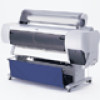Epson Stylus Pro 10000 - Photographic Dye Ink User Manual - Page 114
Configuring the Parallel Interface, support ECP mode. See your computer
 |
View all Epson Stylus Pro 10000 - Photographic Dye Ink manuals
Add to My Manuals
Save this manual to your list of manuals |
Page 114 highlights
5-10 | Monitoring and Configuring the Printer Note If you experience any problems using ECP mode, switch back to compatible mode. Only a parallel connection can be configured to use ECP mode. 2. Press the Item button repeatedly until INTERFACE=AUTO* appears on the display. This is the default setting. • Press the + button once to select the parallel interface. INTERFACE=PARALLEL appears on the display. • Press the + button again to select the USB interface. INTERFACE=USB appears on the display. • Press the + button again to select the FireWire interface. INTERFACE=OPTION1 appears on the display. • Press the + button again if you have installed the optional Ethernet Type B interface card for network connectivity. INTERFACE=OPTION2 appears on the display. You can use the + or - button to cycle through all four settings. 3. When you have selected the setting you want, press the Enter button to save it. Then press the SelecType button to exit the Printer Setting menu. Configuring the Parallel Interface You can use the control panel to change the parallel interface to ECP mode for faster printing. To use this mode, you must connect a computer directly to the printer's parallel interface (without a RIP), and the computer must support ECP mode. See your computer's documentation for details. Follow these steps to configure the parallel interface: 1. Press and hold the Pause button while you press the Power button to turn on the printer. HEX DUMP = PRINT appears on the display. 2. Press the Item button repeatedly until PARA. I/F=COMPAT* appears on the display. The asterisk (*) indicates that compatible mode (the default) is selected. 3. Press the + button. PARA. I/F=ECP appears on the display. This sets the parallel interface to ECP mode. 4. Press the Enter button to save your setting. Then press the Power button to turn the printer off and exit maintenance mode. 5-10















